Business agility refers to an organization being able to adapt quickly. In today's challenging and fast-paced environment, organizations need to make quick and informed decisions to stay ahead of the competition. Enterprise resource planning (ERP) software can provide organizations with real-time data to help leadership teams estimate, plan, and adjust to changing market conditions. Agile businesses also use technology to automate high-volume, routine tasks to help reduce administrative burden and increase cost savings. In this article, we’ll cover some of the ways Microsoft Dynamics 365 Finance supports business agility.
Dynamics 365 Finance leverages many elements of the overall Microsoft architecture, such as Azure, DevOps, Office 365, Active Directory, and Security features. As a top-level ERP system, it’s designed to handle the financial, transactional, budgeting, reporting, planning, and compliance requirements large organizations manage. Below is an overview of the core modules found in Dynamics 365 Finance.
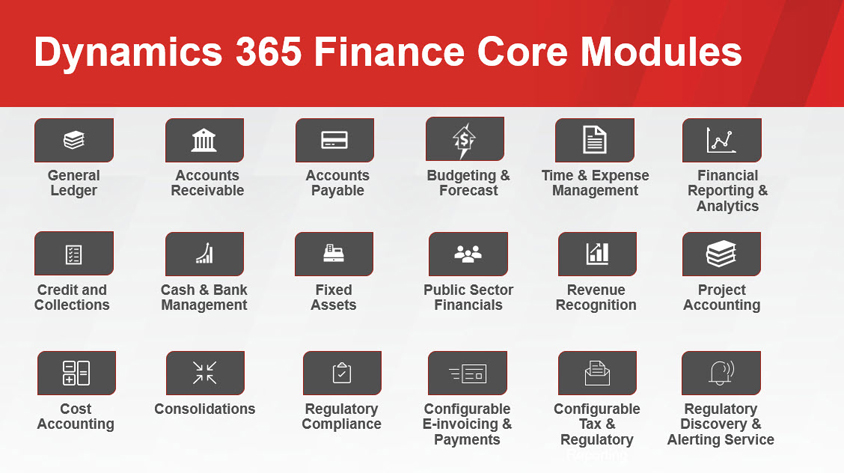
Is Your Business Agile?
As with most business objectives, you can only manage what you can measure. This applies to agility as well. According to Microsoft, here are some indicators that agility is embedded in your organization:
- Speed to insight – How quickly can people in your organization get answers that help them make business decisions?
- Time to market – How long does it take for a product, service, or feature to get to market from beginning to end? How does this compare to competitors?
- Decentralized decision making – Are people throughout your organization empowered and informed to make decisions to help accelerate results?
- Efficiency – How much active work time is required to complete work compared to time spent waiting for other processes to complete?
- Change aptitude – How long does your business take to respond to a change in suppliers, markets, or customer demand?
- Cycle times – Do you measure the speed of your business processes (procure to pay, order to cash, etc.) and drive continuous improvements?
How ERP Can Help Improve Business Agility
An ERP system may be one of the most significant investments an organization will make. Dynamics 365 Finance is a powerful solution that supports business agility by providing dashboards with real-time finance and operations information along with strategic planning tools.
One of the key benefits of Dynamics 365 Finance is its real-time reporting capabilities. With up-to-date financial information, leadership teams can make informed decisions and respond to market changes swiftly. For example, if a company is experiencing a cash flow issue, the finance team can use the real-time reporting tools in Dynamics 365 Finance to quickly identify the cause and take action to resolve it. This allows finance professionals to respond quickly but also be proactive and accurately project cash flow as shown below.
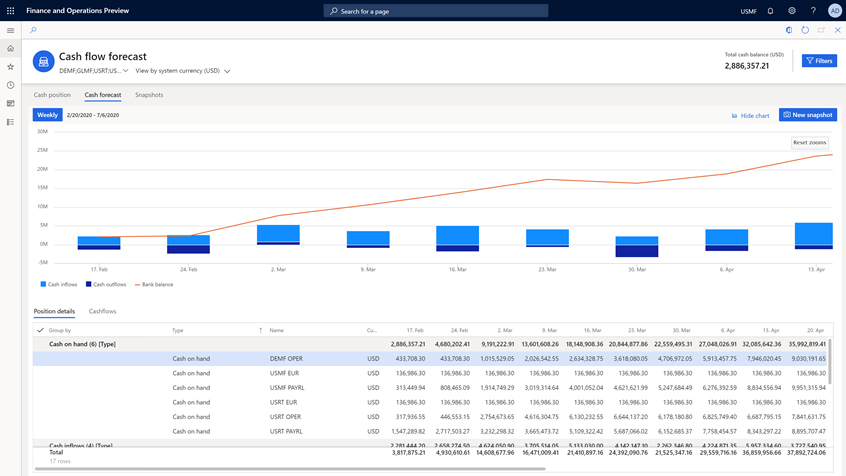
Another advantage of Dynamics 365 Finance is its integration with other Microsoft solutions, such as Power BI and Power Apps. This integration enables companies to easily access and analyze financial data from multiple sources, providing an in-depth view of their financial performance. This, in turn, helps to inform strategic business decisions so the organization can respond resourcefully to market conditions.
Below, see an example of how global financial operations can be monitored in real time. When data is presented in an easy-to-understand format, decisions can be made faster, which can help support business agility and growth.
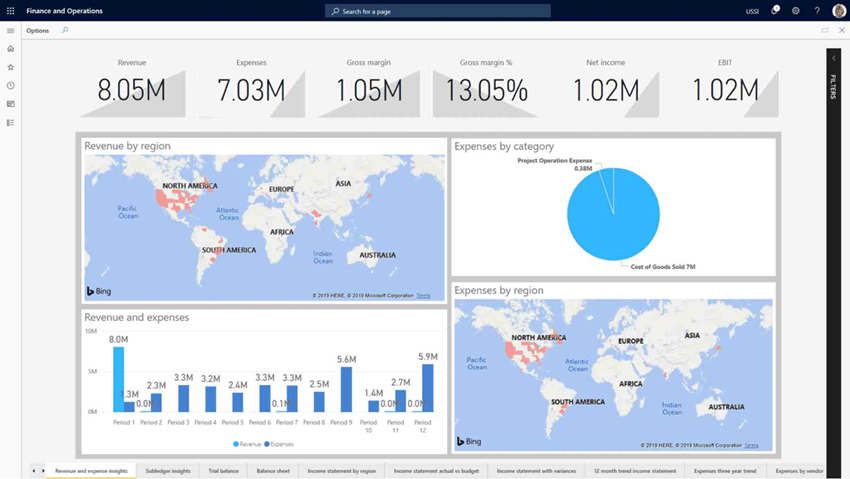
Having a user-friendly ERP system also benefits real-time reporting, as users need to be able to add data effectively. In Dynamics 365 Finance, administrators can activate in-depth financial reporting capabilities that natively handle foreign exchange and support multiple legal entities and currencies in a single instance as shown below.
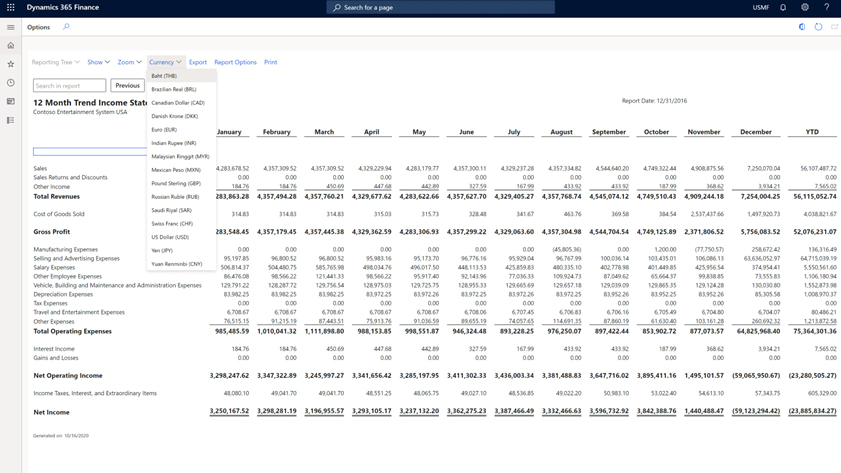
Another key Dynamics 365 Finance capability is budget proposal analysis. Finance teams can use the Intelligent Budget Proposal feature to consolidate and analyze years of historical data and create an accurate, detailed budget proposal. The system also can provide a view of projects over budget along with project summary information (example below). With contextual insights that can be seen within a connected workflow, finance and leadership teams can collaborate on project profitability, process enhancements, cost reductions, and growth opportunities.
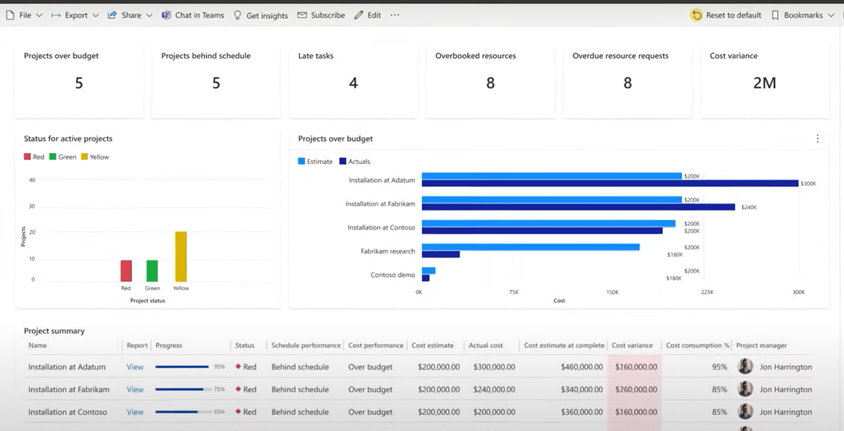
In addition, Dynamics 365 Finance includes robust security features, helping sensitive information stay protected. This is particularly important for large organizations, as they often have strict requirements for data management, security, and compliance.
Dynamics 365 Finance also is highly customizable, making it easy for organizations to tailor the system to their specific needs and requirements. This customization can help organizations consolidate and streamline business processes to provide a single source for real-time insights and business intelligence. Connected data can help inform leadership teams faster and more reliably than when data is stored in multiple, disparate systems.
In conclusion, Microsoft Dynamics 365 Finance is a powerful solution that supports business agility by providing real-time financial reporting and planning insights, native integrations with many other systems, customization, and robust security features. For organizations looking to explore what else Dynamics 365 Finance can do, the Business Technology Solutions Team at Forvis Mazars is ready to assist. Connect with us to learn more.
Related reading: Microsoft Dynamics 365 for Manufacturing: What’s Possible
